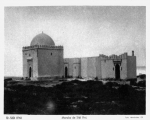
In prehistoric times , people in Morocco weren’t united religiously. Each clan and tribe had its own god including the Ait Baamrane tribes. Beliefs were based on sculptures, the sun, the moon, the fire, stones, statues of gargoyles and naked women with big breasts which referred to fertility goddess Innah . Innah is still present today in the Tachalhit dialect meaning Mother. Christianity was first introduced in the second century and gained converts in towns and amongst slaves and Berber farmers who were under the rule of the Roman Empire. Conversion to Christianity was not compulsory according to historians who didn't discover any trace of Christianity with the Ait Baamrane tribal areas. Traditionally Islam first reached Morocco during the invasion of the Arab general Uqba who reached the shores of the Atlantic in 684. However, it seems likely that the first real invasion, as opposed to a temporary raid, took place at the beginning of the eighth century under General Musa ibn Nusayr and went as far as to the region of Sidi Ifni. The predominantly Berber population was quickly converted to Islam and took part in the Muslim conquest of Spain. People from Ait Baamrane have been Muslim since that invasion but the worshipping of tombs, idols and shrines and the sacrifice of sheep, goats or cow is still practiced. Other pagan rituals remain such as fire jumping believing that all sins and illness will disappear or burning incense to cure patients from evil spirits etc. There was also a Jewish population which resided and coexisted with Muslims. Historians believe they originated from Israel after they were expelled or from building trade relations with Morocco. Other theories are based on a massive conversion to Judaism of Berbers before Christianity. Old Jewish cemeteries and temples called "Mellah" can be found in some Ait Baamrane zones where Moroccan-Jewish people came to visit and wanted to remember their origin. Today Jews have disappeared from the region either because they converted to Islam or moved back to Israel. In conclusion Islam is the main religion in "Ait Baamrane" and certain rituals and habits of traditional celebrations from the past remain.